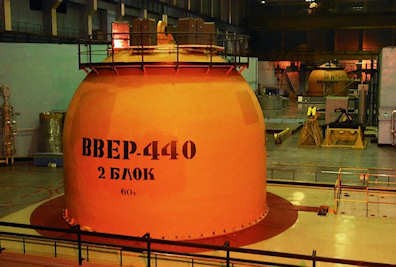 Continuing the article on Bulgaria, Russia, and power politics, I want to quote directly from sources that Sevdalina, a Bulgarian correspondent and concerned citizen, provided for me. Here is what Sevdalina wrote to me about 10 days ago:
Continuing the article on Bulgaria, Russia, and power politics, I want to quote directly from sources that Sevdalina, a Bulgarian correspondent and concerned citizen, provided for me. Here is what Sevdalina wrote to me about 10 days ago:
Because my poor writing skills in English I copied some information from respectful sources and hope it is useful for you:
1. History:
"Back in 1992, at a G7 summit, it was decided that units one, two, three and four of (Bulgarian) Kozloduy nuclear power plant (NPP), along with Bohunice NPP in Slovakia and Ignalina NPP in Lithuania, had to be closed as they presented an unacceptably high level of risk.
In 1999, following strong pressure from Brussels ahead of the decision to open accession negotiations, Bulgaria agreed to close units one and two. In the meantime, Sofia modernised units three and four, insisting that they no longer represented a threat. But in October 2002, the country again bowed to foreign pressure and agreed to close units three and four the night before the country's EU accession. This greatly aided the conclusion of the negotiations.
Units five and six of the Russian-built Kozloduy NPP are considered safe and will continue to operate. Despite EU pressure, the closed units were not disassembled.
Bulgaria receives 100% of its gas supplies from Russia and produces virtually no gas of its own. The country has a single gas storage capacity, with very limited reserves."
2. Gas crisis:
"Hit worst by the current Russia-Ukraine gas dispute, Bulgaria is poised to restart one of the nuclear reactors at its Kozloduy nuclear power plant, the closure of which was one of the conditions of the country's EU accession.
As the gas supply from Russia to the country was shut off completely during the night of 5-6 January (EurActiv 06/01/09 ), Bulgarian President Georgi Parvanov on 6 January declared that according to Article 36 of the country's accession treaty, the decommissioned reactors could be reactivated in crisis situations such as the present one.
Without specifically mentioning Kozloduy NPP, the article reads that for a period of three years after accession (Bulgaria joined in January 2007), if 'difficulties arise which are serious and liable to persist in any sector of the economy or which could bring about serious deterioration in the economic situation of a given area, Bulgaria [...] may apply for authorisation to take protective measures in order to rectify the situation and adjust the sector concerned to the economy of the internal market'.
A team of experts is already working at Kozloduy NPP amid preparations to restart the reactors, according to Bulgarian press reports. Ivan Genov, director of Kozloduy NPP, said it would take a month to restart unit four, which was shut down on the eve of Bulgaria's accession on 31 December 2006.
According to the country's constitution, the Bulgarian president alone cannot decide on issues such as restarting Kozloduy's closed units. Prime Minister Sergey Stanishev has so far maintained his silence over the issue.
European Commission spokesperson Ferran Tarradellas said yesterday that he would not comment on the reopening of Kozloduy's units as long as the EU executive had not received an official request to do so from Bulgaria. He agreed that the situation in the country was "a crisis", but said the EU's gas coordination group was to meet on Friday to assess the impact of the crisis. Only after this meeting would decisions to address the country's problems be adopted, he explained.
Kozloduy supplied about half of Bulgaria's electricity, before four of its six reactors were closed amid safety concerns. The US department of energy described Kozloduy as "one of the world's most dangerous nuclear installations".
Source: http://www.euractiv.com/en/energy/bulgaria-threatens-restart-nuclear-plant/article-178323
3. New nuclear plant - Belene:
"Like Kozloduy, Belene is sited near the Danube and any safety incident could have widespread effects. Some of the strongest criticism comes from the man who used to run Bulgaria's nuclear safety authority. Georgi Kastchiev, now working at the Institute of Risk Research in Vienna, says this type of Russian reactor "has never been built anywhere else in the world".
He doubts 'the quality of Russian nuclear industry, because two years ago they delivered faulty equipment to Chinese reactors'.
Nifty footwork.
Another worry is that the nuclear plant will be built in a region prone to severe earthquakes.
Belene will also cement Bulgaria's dependency on Russia, on which it almost entirely relies for oil and gas.
Ognyan Minchev, who runs Sofia's Institute for regional and International Studies, argues that is not necessarily a problem "at a time when we presume that relationships between Russia and the West are going to be positive and good".
But, he warns, "any time when we see particular problems and challenges within those relationships, Bulgaria - a member of Nato and the EU - will be on the very dividing line".
Bulgaria and Russia are fellow Slavs, linked by language and religion.
They are currently celebrating 130 years of historic ties with high-level visits, exhibitions and ballet performances. When it comes to energy, Bulgaria is by no means the only EU country dancing to Moscow's tune. But it will require some nifty political footwork to keep its balance between its old friends in Moscow and its new partners in Europe."
Source: http://news.bbc.co.uk/2/hi/europe/7488508.stm
Thank you, Sevdalina my friend, for all this information.